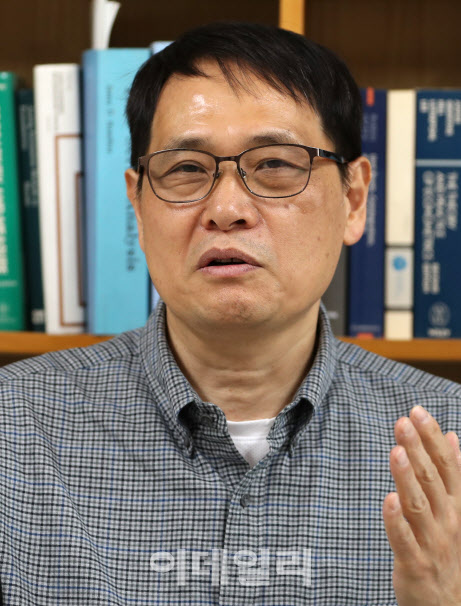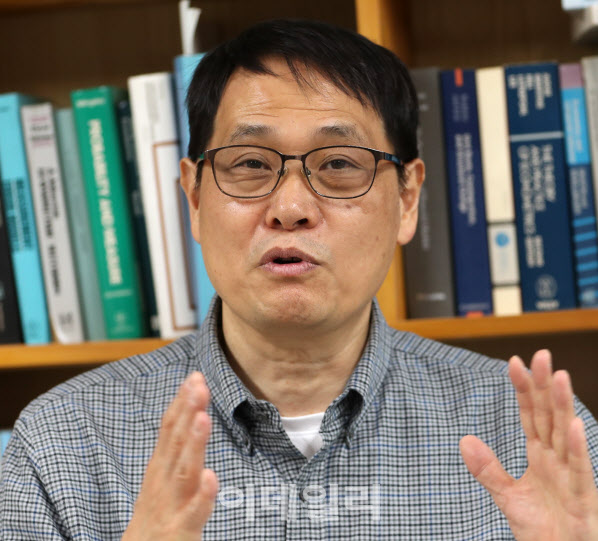[Jiyu Kong, Edaily Reporter] “It’s clear that Korea’s rapidly aging society will worsen the country’s fiscal outlook. Rather than increasing fiscal deficits with supplementary budgets, we need bold expenditure restructuring to reduce the burden on citizens.”
Young-Jun Jeon, Professor of Economics and Finance at Hanyang University, emphasized in a recent interview with Edaily that the mounting fiscal pressures caused by declining tax revenues and rising spending needs as the population ages. As a financial expert and former president of the Korean Fiscal Policy Association, Jeon will deliver a presentation on the first day of the 16th Edaily Strategy Forum to discuss the urgent need for fiscal restructuring in response to the challenges posed by an aging population.
|
Korea‘s aging population is leading to a sharp increase in welfare spending, significantly intensifying fiscal burdens. According to the Ministry of Economy and Finance, in this year’s main budget of 673.3 trillion KRW, mandatory expenditures, those government expenses that cannot be easily reduced, account for 54.2%. This percentage is projected to rise to 57.3% by 2028. As mandatory spending on pensions and healthcare grows, the budget available for discretionary spending - such as economic stimulus - will inevitably shrink.
“If things continue as they are, we could see fiscal collapse within 10 to 15 years”, Jeon warned. He called for urgent restructuring of rigid mandatory expenditures, highlighting the need to reform local education grants, which continue to rise annually in line with domestic tax revenues, regardless of falling school-age populations. He stressed the urgent need to restructure rigid mandatory expenditures to secure financial stability for future generations. One of his key concerns is the Local Education Finance Grants, which continue to increase annually, tied to domestic tax revenues, despite the declining school-age population. “Local education grants rise with domestic tax revenue growth, leading to wasteful spending”, he said. “With population decline in local areas due to urban concentration, these grants must be restructured.”
Jeon also stressed the need for more substantial reforms to public pensions, including the National Pension and civil servant pensions. He criticized the recent National Pension reform - which raised contribution and replacement rates to 13% and 43%, respectively - as ineffective. While the reform delays fund depletion by 8 years, the debt burden on future generations remains substantial. “The ticking time bomb’s speed has slowed, but its size has grown,” he remarked.
Jeon further emphasized that long-term care insurance, health insurance, and other welfare-related fiscal expenditures will rapidly increase as the population ages. He warned that this would squeeze discretionary spending, including investments in social overhead capital (SOC) and economic stimulus measures, ultimately hindering the government‘s ability to fully function financially. He reiterated the necessity of bold fiscal reform to address these growing concerns.
|
Jeon criticized the current trend of expanding budgets through supplementary spending without fundamental reform, pointing to the recent 13.8 trillion KRW supplementary budget passed by the National Assembly on May 1, which increases the fiscal deficit ratio from 2.8% to 3.3% of GDP, breaching the government’s own rule, established in 2022, of keeping deficits below 3%.
While political and business leaders argue for economic stimulus amid growing uncertainty, Jeon warned against indiscriminate fiscal expansion that could worsen fiscal health and increase the public burden. “It’s right to spend carefully on truly necessary areas during downturns, but cash handouts like local currency distributions should be avoided,” he said.
Jeon urged the incoming government, set to take office in June, to prioritize comprehensive expenditure restructuring to ensure future fiscal sustainability. “Without urgent reforms in health insurance, pension, and local finance, the government’s policy activities will soon be severely constrained,” he cautioned.
About Prof. Young-Jun Jeon…
△Bachelor’s degree in economics from Seoul National University △Ph.D. in economics from the University of Pennsylvania △Former Research Fellow at the Korea Institute of Public Finance △Former Professor of Economics, Incheon National University △Professor in the Department of Economics and Finance at Hanyang University






